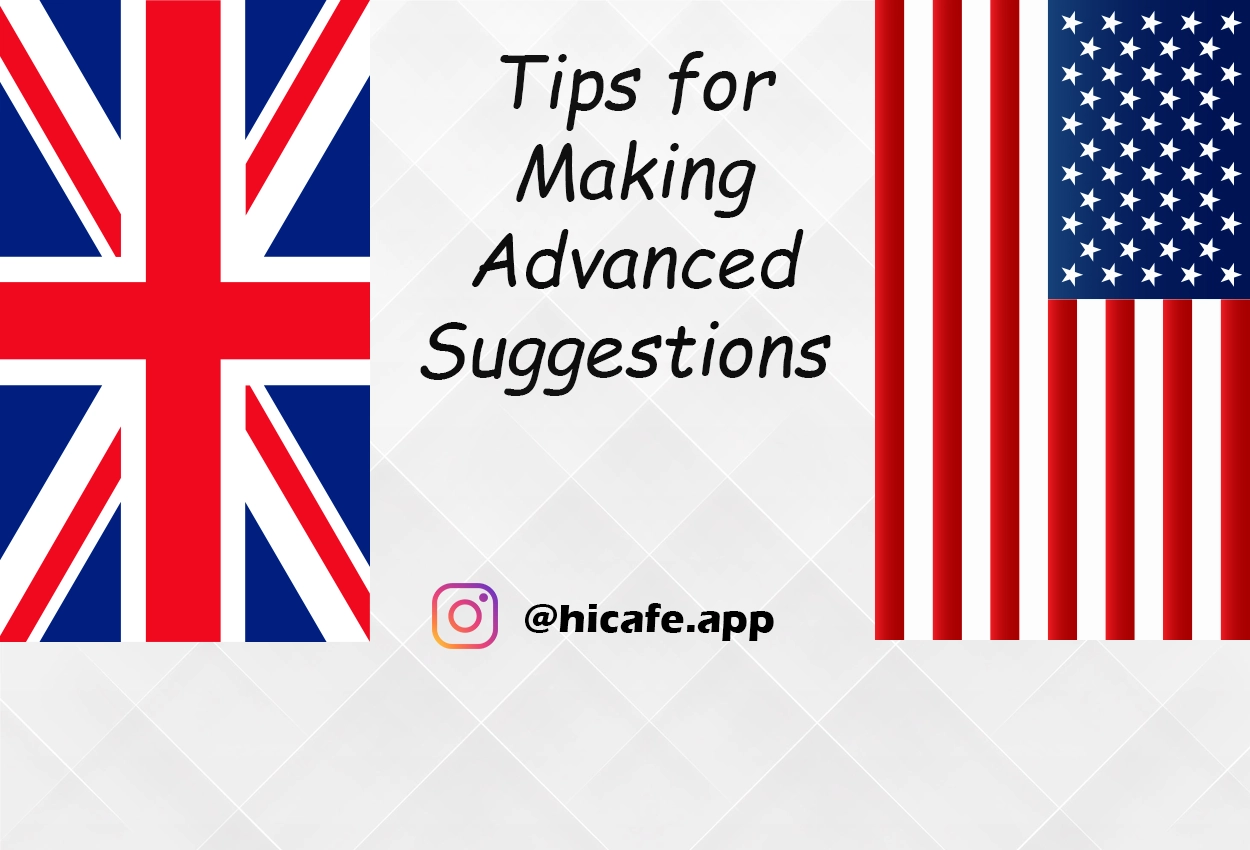
This lesson will explore seven advanced phrases for making suggestions in English grammar that sound more natural and less forceful, allowing you to offer advice without sounding preachy. By incorporating advanced phrases, you can sound more natural and considerate in your communication.
Previous Conversation Tip Lesson
Making a Generalization in English
Making Suggestions in English Conversation
How to make suggestions
- I thought we might / could …
When suggesting something, using past modals like “might” and “could” creates a sense of distance and makes the suggestion sound less forceful. This allows the recipient to disagree without feeling pressured or offended, promoting a more open conversation.
- I thought we might try that new coffee shop downtown. They have amazing pastries.
- I thought we could take a weekend trip to the mountains. It would be nice to get away.
You can also use this phrase with “I”:
- I thought I might enroll in a drawing class this year.
- Can’t you ..? / Couldn’t you ..?
Using the negative form of “can” or “could” transforms a suggestion into a more forceful request, often implying that the listener should consider the action as a necessity rather than an option. For example:
- Can’t you just try sending the email again? Maybe there was a connection issue.
- Couldn’t you ask Sarah to help with the project? She has experience in that area.
- You could always…
This is a good alternative to saying “You could”. For example:
- You could always try taking a break from work and spending some time with family.
- You could always ask your neighbor for help if you need to borrow some tools.
- You could do worse than…
When you say this, remember that the verb following “than” is in the infinitive form without “to”:
- You could do worse than apply for that internship at the tech startup. They’re really innovative.
- You could do worse than try joining the local book club. They have interesting discussions.
- You may / might as well…
Remember that the verb following this phrase is also in the infinitive form without “to”. It’s a great phrase for making suggestions because it shows that the suggestion is logical. For example:
- You might as well finish the project while you’re at it. It’ll be off your mind.
- You may as well get a second opinion from a doctor just to be sure.
- I’m thinking out loud here…
This phrase is commonly used when someone wants to share an idea or suggestion, but they haven’t fully fleshed it out yet. By saying it’s just a thought “out loud”, they create space for the other person to offer feedback or critique.
- I’m thinking out loud here, but maybe we could repaint the kitchen a brighter color.
- I’m thinking out loud here… What if we tried hosting a potluck dinner next month?
- Well, if you want my opinion…
- Well, if you want my opinion, you should definitely go for the job interview. It seems like a good fit.
- Well, if you want my opinion, I think you should try to save some money for a rainy day.
How to respond to suggestions
Here are some common ways to respond to suggestions:
- I thought we might / could…
Yes, good idea.
Yes, I’d be up for that.
- Can’t you / Couldn’t you..?
Well no, I can’t actually.
Well I could I suppose, but…
- You could always…
May as well.” / “Might as well.
- You could do worse than…
Yeah, you’re right.
- You may / might as well…
Good point.
- I’m thinking out loud here…
Hmm, interesting, but don’t you think…
- Well, if you want my opinion…
Actually, I don’t!
Conclusion
Next time you want to offer a suggestion or respond to one, consider using these advanced phrases. Remember, communication is not just about what you say, but how you say it! So, remember to respond appropriately to suggestions, whether you agree or disagree. By using these phrases, you’ll be able to express your ideas with greater finesse.
Next Conversation Tip Lesson
100 Intermediate English Phrases
Related Conversation Lessons
None
Practice Conversation with HiCafe App
By using HiCafe App, you can join free discussion events and Practice English Conversation online or in-person and improve your verbal skills.
All Conversation Lessons
To see and read all of our conversation lessons, you can visit our Improve English Speaking Skills page.


